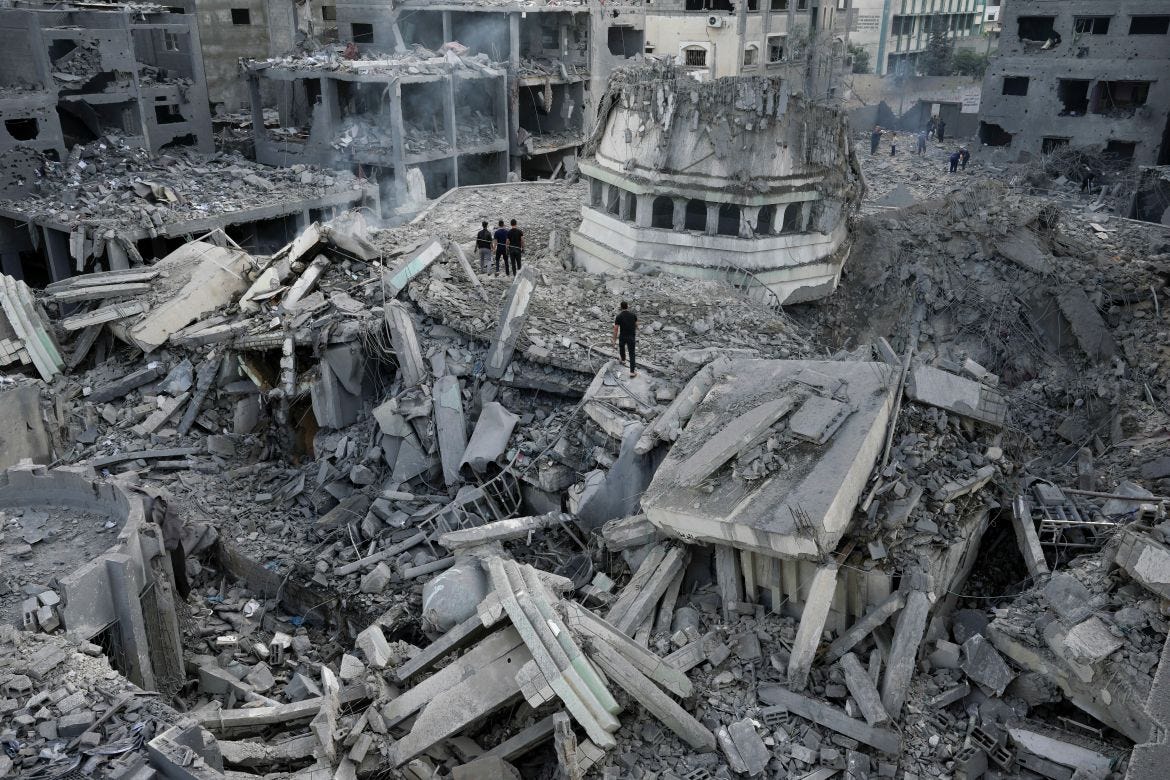The US has a way of building castles of sand in the Middle East. The one now crumbling in the wake of the Hamas attack on Israel may prove as damaging to the US as was the 2003 invasion of Iraq by the younger Bush administration. In recent times, the US has put considerable effort into encouraging the development of diplomatic and business ties between some Arab states and Israel, in particular with Saudi Arabia and the Gulf states. Meanwhile, it has also continued to underwrite the Sisi regime in Egypt, which has been complicit with Israel in keeping the Palestinians in Gaza bottled up, in the process strengthening the hold of Hamas on the territory and breeding yet another generation of victims of the expansion of the Jewish state.
It is worth recalling that 100 years ago last month, the Mandate over Palestine, awarded to the British, was supposed to lead to the self-government of the then 90 percent Arab region of the former Ottoman Empire — at the same time, making it a “National Home for the Jewish people,” a suitably ambiguous phrase announced by the British in 1917 as an attempt to shore up Jewish support in World War I. British rulers struggled for the next 25 years of rising Jewish migration and Palestinian reaction.
Fast forward to today, the key facts that underlie the eruption in Gaza are that Israel’s Jewish population of about 7.2 million rules directly or indirectly over about 6.8 million Palestinians. They comprise the West Bank, seized by Israel in 1967 and since become a patchwork of Palestinian land interspersed with Jewish settlements, a region nominally under the control of the Palestinian Authority but divided by Israeli checkpoints and barriers.
The second largest Palestinian group is in Israel itself. The 2 million who comprise about 19 percent of the total population and who over time have been subject to increasingly discriminatory legislation in an avowedly Jewish state in which the secular liberalism of much earlier Zionism has been superseded by both the narrow nationalism of later migrants and the expansion through its birth rate of the ultra-orthodox religious community.
The third group is the nearly 2 million in the Gaza Strip where Hamas has been in control since 2007 and which defeated Israeli attempts at control. Gaza’s status is wholly anomalous, but its people are an integral part of 75 years of international failure to find or impose a lasting two-state solution to Jewish and Palestinian rights and claims.
However many the Israelis now kill in revenge in Gaza (and the West Bank where lower-level killing of actual or alleged militants has long been in process) is not going to solve that issue. A formidable military and extensive espionage system, US support, and its own nuclear weapons make Israel almost invulnerable to state attack. Its weakness is seeing the original Palestine as one place, internal, and its future set by demographics more than armaments.
The recent focus of the US had been on building Israel’s diplomatic bridges and encouraging Arab states to stop fretting about the Palestinians and focus on their own self-interests. It had considerable success in this though somewhat tempered by China’s own efforts to develop friends in the region. Other Arabs have indeed mostly only paid lip service to the Palestinian cause. But Hamas’ bold and bloody venture will now make that more difficult and bring the issue of Palestinians back on the stage. Attempts will be made by Israelis and the US to blame all this on Iranian support for Hamas. But that misses the point of the depth of Palestinian grievance which needs no encouragement from distant Shia mullahs whose main non-state ally in the region is Hezbollah in Lebanon. Its interests are not the same as those of Hamas, but it has an equally strong record of facing up to Israel.
China’s failure to criticize Hamas has shocked many in the west but elsewhere, especially in other former parts of European empires, there may be a better understanding of the history of the conflict. After many attempts since 1948 at a two-state solution, Jewish settlement has never stopped expanding nor its ability, at least till this week, to kill 10 Palestinians for one of its own.
Meanwhile, a renewed US focus on the Middle East can only draw attention and resources away from its Indo-Pacific interests and also Ukraine at a time when right-wing Republicans are increasingly reluctant to support its defense against Russia.
As for Israel, after its retribution has been delivered – again – to Gaza the question is whether it can see or be made to see the longer-term impossibility of 7.2 million retaining control of 6.8 million mostly rights-less Palestinians.



Both Russia and China can support the Arab countries especially Palestina to counter the political bully tactics of both USA and Israel ! The Muslim world should be united in strength to safe guard the Islamic interests of the nations!